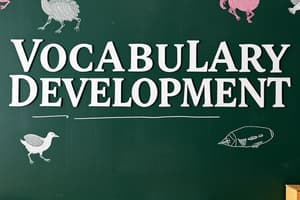Podcast
Questions and Answers
What does the study of word etymology involve?
What does the study of word etymology involve?
- Comparing the meanings of words in different languages
- Investigating the historical development of words (correct)
- Analyzing the pronunciation of words
- Examining the cultural significance of words
What does the etymology of the word 'democracy' reveal?
What does the etymology of the word 'democracy' reveal?
- That it is a system of government by a monarch
- That it is a social movement
- That it is a form of government by the people (correct)
- That it is a economic system
What is the primary factor in determining the meaning of a word in a sentence?
What is the primary factor in determining the meaning of a word in a sentence?
- The prefix of the word
- The context in which the word is used (correct)
- The suffix of the word
- The grammatical function of the word
What is an example of a word with multiple meanings?
What is an example of a word with multiple meanings?
What can understanding the etymology of a word help learners with?
What can understanding the etymology of a word help learners with?
What can be inferred from the sentence 'I need to go to the bank'?
What can be inferred from the sentence 'I need to go to the bank'?
What does the phrase 'bank of the river' clearly refer to in the sentence 'I sat on the bank of the river'?
What does the phrase 'bank of the river' clearly refer to in the sentence 'I sat on the bank of the river'?
Which strategy helps students relate new vocabulary to concepts they already understand?
Which strategy helps students relate new vocabulary to concepts they already understand?
What is the primary goal of using contextual clues in teaching vocabulary?
What is the primary goal of using contextual clues in teaching vocabulary?
What is the benefit of teaching students about word etymology?
What is the benefit of teaching students about word etymology?
Which strategy involves teaching students to think about their own thinking?
Which strategy involves teaching students to think about their own thinking?
What is the primary benefit of encouraging students to practice using new vocabulary words in context?
What is the primary benefit of encouraging students to practice using new vocabulary words in context?
Flashcards are hidden until you start studying
Study Notes
Vocabulary Difficulty: Word Etymology and Contextual Meaning
Vocabulary difficulty can arise from various sources, including word etymology and contextual meaning. Understanding these subtopics can help educators and parents support students' vocabulary development and comprehension skills.
Word Etymology
Word etymology, or word origin, refers to the study of words and their historical development. Understanding the etymology of a word can provide valuable context for understanding its meaning and usage.
For example, the word "democracy" comes from the Greek words "demos," meaning "people," and "kratos," meaning "rule." This etymology reveals that democracy is a form of government by the people. Similarly, the word "biology" is derived from the Greek words "bios," meaning "life," and "logia," meaning "study of." This understanding of word origin helps learners comprehend the subject matter and appreciate the word's semantic history.
Contextual Meaning
Contextual meaning is the interpretation of a word or phrase based on the surrounding context. Words can have multiple meanings, and their meanings may change depending on the context in which they are used.
For example, the word "bank" can refer to a financial institution or the side of a river. Understanding the context in which the word is used can help determine the intended meaning. In a sentence like "I need to go to the bank," it is clear that the speaker is referring to a financial institution. However, in a sentence like "I sat on the bank of the river," it is clear that the speaker is referring to the side of a river.
Strategies for Enhancing Vocabulary Difficulty
To address vocabulary difficulty, educators and parents can employ various strategies:
-
Pre-teach vocabulary: Before introducing new topics or texts, pre-teach the relevant vocabulary to ensure that students have the necessary foundational knowledge to understand the material.
-
Connect vocabulary to prior knowledge: Use real-life examples and analogies to help students relate new vocabulary to concepts they already understand.
-
Encourage explicit instruction: Provide explicit definitions and examples of new vocabulary words to help students understand their meaning and usage.
-
Provide contextual clues: Use context clues, such as sentences and paragraphs, to help students infer the meaning of new vocabulary words.
-
Encourage metacognitive thinking: Teach students to think about their thinking, encouraging them to reflect on what they know and what they need to learn to help them comprehend the material.
-
Incorporate mnemonic devices: Use mnemonic devices, such as acronyms and word associations, to help students remember new vocabulary words and their meanings.
-
Provide opportunities for practice: Encourage students to practice using new vocabulary words in context, such as writing sentences or participating in class discussions.
By understanding the subtopics of word etymology and contextual meaning, educators and parents can develop strategies to help students overcome vocabulary difficulty and improve their comprehension skills.
Studying That Suits You
Use AI to generate personalized quizzes and flashcards to suit your learning preferences.




